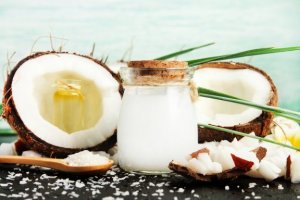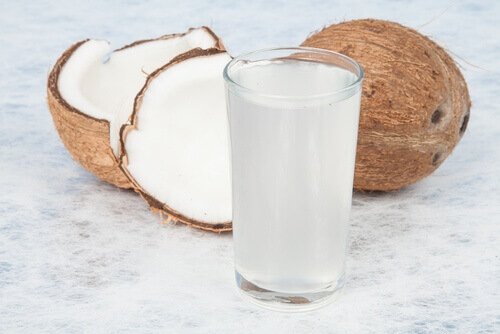The Main Uses of Coconut Vinegar and 11 Properties


Reviewed and approved by the doctor Diego Pereira
Coconut vinegar has many benefits for overall health and beauty. Its vitamins, amino acids, and minerals improve overall health and can be incorporated into any beauty regime.
This vinegar can be extracted from the coconut tree sap or from the water inside the fruit. Either have similar health properties and can greatly benefit your body. Continue reading to find out all it has to offer!
What is coconut vinegar?

As we already mentioned, you can get coconut vinegar from the sap of coconut trees or from the water inside the fruit. The sap comes from the top of the coconut trees, where the flowers and coconuts grow.
After they remove the sap, they ferment it. The fermentation process usually lasts between 45 and 60 days. During the fermentation process, they avoid the use of filters and heating. Therefore, the color of the fermented liquid varies from a light brown to a deep brown, depending on how long it ferments. Solid remnants at the bottom of the bottle are a sign of good quality coconut vinegar.
We think you may also like to read: How Coconut Oil Fights Fatty Liver Disease
Amino acids and other compounds of coconut vinegar
The coconut sap is loaded with essential amino acids, vitamin B, vitamin C, probiotics, and prebiotics. In addition, it’s rich in minerals like phosphorus, iron, potassium, sulfur, boron, zinc, copper, and manganese. It has a very low glycemic index and an almost neutral pH.
Thus, the health properties of this substance are many and varied.
1. Diabetes
Coconut vinegar is good for diabetics. Because of its acetic acid content, it helps modulate blood glucose control. However, the results are more effective in healthy people than in those who already have diabetes at the moment.
2. Weight loss
Coconut vinegar can play a complementary role in weight loss efforts as researchers observed it can help to reduce appetite. This is because acetic acid has a satiating effect ideal for weight loss. According to data published in the European Journal of Clinical Nutrition, fermented and pickled products have a potential interest in increasing the rate of satiety.
3. Digestive function
As a fermented good, its probiotics and enzymes support digestion and gastrointestinal tract health.
4. Coconut vinegar can help keep viruses and bacteria at bay
The potential antibacterial and antimicrobial properties of coconut vinegar make it useful in the treatment of wounds, while strengthening the immune system.
5. Cardiovascular protector
The health properties of coconut vinegar can improve heart health. This is because some of its components have an impact on various cardiovascular risk factors. On the one hand, these help reduce body weight, fat mass and triglycerides in the blood. On the other, they might have positive effects on blood cholesterol levels (this action has only been observed in animals). Finally, the potassium content of this substance might help maintain normal blood pressure.
The vinegar from coconut water

The vinegar made from coconut water doesn’t have as many health properties as that made from sap. In order to make it, you must first ferment the water with sugar and yeast. Then, you proceed to strain it with a cloth. Afterward, you must add more sugar and dissolve it as you boil it at a temperature of 140°F for 20 minutes.
Finally, you place the mixture in a container along with the yeast and allow it to sit for one week. Foam will appear after a few days and the solution will have an acidic flavor. You can then filter it or drink it as it is. This type of coconut vinegar is one of the healthiest ones out there.
Like this article? We think you may also like to read: Apple Cider Vinegar, Ginger, and Honey Digestive Tonic
Health properties and uses of coconut vinegar
6. Digestive remedy
As mentioned above, vinegar is a probiotic that can greatly promote digestive health. Coconut water vinegar also fulfills this function. To obtain this benefit, make a remedy by mixing one tablespoon of water at room temperature with one tablespoon of coconut vinegar. Then, take it daily on an empty stomach.
You can also relieve ulcers, infections, stomach irritation, and other digestive conditions with a mixture of a teaspoon of it and one of honey. You’ll notice significant improvement after taking this vinegar every day on an empty stomach. Those with an irritable colon should be careful, as it’s a fermented good.
7. A drink to help you lose weight
If your intention is to lose weight, mix two tablespoons of vinegar with a glass of water before a meal. This is because it’ll decrease the sugar content in your blood as well as your appetite. Researchers are aware of the efficacy of coconut water vinegar in the treatment of obesity in non-human animals. In addition, it’s hypolipidemic and has anti-inflammatory effects.
8. Hepatic aid
Coconut vinegar improves intestinal transit and promotes liver function. Thus, it is an excellent depurative that promotes digestion and the secretion of bile. Tested on animals, it’s apparently effective in improving the accumulation of fat in the liver.
9. Antioxidant
Coconut vinegar also prevents the proliferation of bacteria and controls free radicals due to its antioxidants. It’s rather tasty as a salad dressing.
The cosmetic uses of coconut vinegar

Coconut vinegar not only has benefits when you eat it. You can also use it topically. However, do a little skin test and always apply it diluted in water — never directly on the skin.
10. Hair volume and shine
Coconut vinegar is an ideal cosmetic. Leave it on your hair for 20 minutes before washing it to improve hair volume and shine. As for your face, this substance is great for decreasing the appearance of aging and is also a great disinfectant for oily skin.
11. Facial care
Reduce dark circles under your eyes with controlled massages with coconut vinegar to stimulate circulation. It’ll also help you diminish blackheads, acne marks, and age spots.
This substance also removes impurities and wrinkles when you apply it as a toner directly to your skin. Dilute a tablespoon in a tablespoon of water and do a facial cleansing every night by applying it to your face with a cotton pad.
The regular use of coconut vinegar has cosmetic and health benefits.
As you can see, this natural vinegar has many health properties and applications. In addition to the well-being of the organism, it significantly improves your appearance.
In general, it’s a safe product. However, don’t drink vinegar straight as it could damage your dental enamel and esophagus mucosa. Thus, the best way to benefit from it is by diluting it in water and other ingredients (in the form of a dressing).
This product impacts blood glucose and blood pressure, so consult your doctor about its inclusion in your regular diet as a remedy for any of these two health conditions.
Finally, keep in mind that this substance is mainly a condiment and you should use it in moderation. That is, within the framework of a healthy diet and lifestyle.
All cited sources were thoroughly reviewed by our team to ensure their quality, reliability, currency, and validity. The bibliography of this article was considered reliable and of academic or scientific accuracy.
- Alatawi, K. A., & Alshubaily, F. A. (2021). Coconut products alleviate hyperglycaemic, hyperlipidimic and nephropathy indices in streptozotocin-induced diabetic wistar rats. Saudi journal of biological sciences, 28(8), 4224–4231. Recuperado de: https://www.ncbi.nlm.nih.gov/pmc/articles/PMC8324991/.
- Asghar, M. T., Yusof, Y. A., Mokhtar, M. N., Ya’acob, M. E., Mohd Ghazali, H., Chang, L. S., & Manaf, Y. N. (2019). Coconut (Cocos nucifera L.) sap as a potential source of sugar: Antioxidant and nutritional properties. Food science & nutrition, 8(4), 1777–1787. Recuperado de: https://www.ncbi.nlm.nih.gov/pmc/articles/PMC7174220/.
- Atputharajah, J. D., Widanapathirana, S., & Samarajeewa, U. (1986). Microbiology and biochemistry of natural fermentation of coconut palm sap. Food Microbiology, 3(4), 273-280. recuperado de: https://www.sciencedirect.com/science/article/abs/pii/0740002086900092.
- Gunathilake, K. D. P. P. (2011). Development of low cost coconut water vinegar making process and evaluation of “generator process” to accelerate the acetification. CORD, 27(1), 6-6. Recuperado de: https://pubag.nal.usda.gov/catalog/7850899.
- Jannah, S. N., Handayani, D., Purwantisari, S., Yulianto, M. E., Amalia, R., & Hartati, I. (2020, January). Application of response surface methodology to the optimization of coco vinegar production as antioxidant and antidiabetes through bubble biofermentation process. In AIP Conference Proceedings (Vol. 2197, No. 1, p. 060004). AIP Publishing LLC. Recuperado de: https://aip.scitation.org/doi/abs/10.1063/1.5140931.
- Johnston, C. S., Kim, C. M., & Buller, A. J. (2004). Vinegar improves insulin sensitivity to a high-carbohydrate meal in subjects with insulin resistance or type 2 diabetes. Diabetes care, 27(1), 281-282. Recuperado de: https://diabetesjournals.org/care/article/27/1/281/26582/Vinegar-Improves-Insulin-Sensitivity-to-a-High.
- Malakul, W., Seenak, P., Jumroon, N., Arikit, S., Kumphune, S., & Nernpermpisooth, N. (2022). Novel Coconut Vinegar Attenuates Hepatic and Vascular Oxidative Stress in Rats Fed a High-Cholesterol Diet. Frontiers in nutrition, 9, 835278. Recuperado de: https://www.ncbi.nlm.nih.gov/pmc/articles/PMC8959456/.
- Mohamad, N. E., Yeap, S. K., Beh, B. K., Ky, H., Lim, K. L., Ho, W. Y., Sharifuddin, S. A., Long, K., & Alitheen, N. B. (2018). Coconut water vinegar ameliorates recovery of acetaminophen induced liver damage in mice. BMC complementary and alternative medicine, 18(1), 195. Recuperado de: https://www.ncbi.nlm.nih.gov/pmc/articles/PMC6019733/.
- Mohamad, N. E., Keong Yeap, S., Beh, B. K., Romli, M. F., Yusof, H. M., Kristeen‐Teo, Y. W., … & Alitheen, N. B. (2018). Comparison of in vivo toxicity, antioxidant and immunomodulatory activities of coconut, nipah and pineapple juice vinegars. Journal of the Science of Food and Agriculture, 98(2), 534-540. Recuperado de: https://onlinelibrary.wiley.com/doi/abs/10.1002/jsfa.8491.
- Mohamad, N. E., Yeap, S. K., Ky, H., Ho, W. Y., Boo, S. Y., Chua, J., … & Alitheen, N. B. (2017). Dietary coconut water vinegar for improvement of obesity-associated inflammation in high-fat-diet-treated mice. Food & Nutrition Research, 61(1), 1368322. Recuperado de: https://www.tandfonline.com/doi/full/10.1080/16546628.2017.1368322.
- Mohamad, N. E., Yeap, S. K., Abu, N., Lim, K. L., Zamberi, N. R., Nordin, N., Sharifuddin, S. A., Long, K., & Alitheen, N. B. (2019). In vitro and in vivo antitumour effects of coconut water vinegar on 4T1 breast cancer cells. Food & nutrition research, 63, 10.29219/fnr.v63.1616. Recuperado de: https://www.ncbi.nlm.nih.gov/pmc/articles/PMC6387426/.
- Xu, S., Ma, Z., Chen, Y., Li, J., Jiang, H., Qu, T., … & Liu, S. (2022). Characterization of the flavor and nutritional value of coconut water vinegar based on metabolomics. Food Chemistry, 369, 130872. Recuperado de: https://www.sciencedirect.com/science/article/abs/pii/S0308814621018781.
This text is provided for informational purposes only and does not replace consultation with a professional. If in doubt, consult your specialist.








